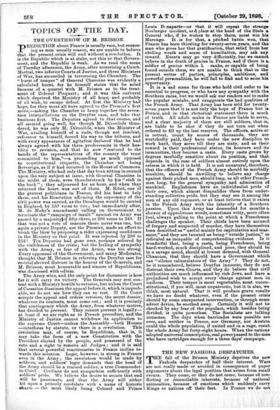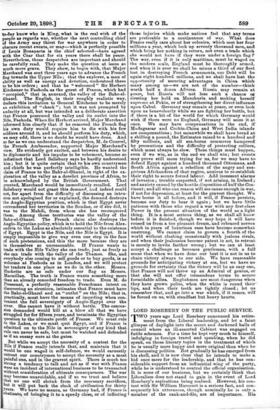THE NEW FASHODA DESPATCHES. T HE fall of the Brisson Ministry
deprives the new Fashoda despatches of half their interest. Wars are not really made or avoided in consequence of paper arguments about the legal position that arises from small events. They come, or they do not come, because of con- flicting or reconcilable interests, because of national animosities, because of emotions which suddenly carry Kings or nations off their feet. In France we do not to-day know who is King, what is the real wish of the people as regards war, whether the next controlling chief of the Army may thirst for war anywhere in order to obscure recent events, or may—which is perfectly possible if Louis Bonaparte is the chief selected—have agreed with the Czar that for six years there shall be peace. Nevertheless, those despatches are important and should be carefully read. They make the question at issue so much more grave. They show, to begin with, that Major Marchand was sent three years ago to advance the French flag towards the Upper Nile ; that the explorer, a man of ability as well as energy and devotion, understood these to be his orders ; and that he " welcomed" Sir Herbert Kitchener to Fashoda as the guest of France, which had " occupied," that is, annexed, the valley of the Bahr-el- Ghazel. The English, in their roughly realistic way, declare this invitation to General Kitchener to be merely an exhibition of " cheek "; but it was not prompted by audacity at all, but was intended as a deliberate assertion that France possessed the valley and its outlet into the Nile, Fashoda. When Sir Herbert arrived, Major Marchand informed him clearly that if he removed the French flag his own duty would require him to die with his few soldiers around it, and he should perform his duty, which, we may add, there is no doubt he would have done. And so far as we can understand the despatches, M. de Coureel, the French Ambassador, supported Major Marchand's view. He evidently got excited, and between his desire to be diplomatic and his impulse to be vehement, became so indistinct that Lord Salisbury says he hardly understood him ; but it is quite certain that to his own countrymen and chiefs he was perfectly intelligible. He wanted the claim of France to the Bahr-el-Ghazel, in right of the ex- ploration of the valley as a derelict province of Africa, to be acknowledged by the British Government. That vented, Marchand would be immediately recalled. Lord Salisbury would not grant this demand. and indeed could not, for apart from the difficulty of discussing an intru- sion not apologised for or explained, the demand destroys the Anglo-Egyptian position, which is that Egypt never surrendered her territories in the Soudan, or if she did, it was to the Mandi, from whom she has reconquered them. Among those territories was the valley of the Bahr-el-Ghazel. The French claim also destroys the Anglo-Egyptian policy, which is to hold the Nile from Alex- andria to the Lakes as absolutely essential to the existence of Egypt. Egypt is the Nile, and the Nile is Egypt. It is simply impossible to give way even one step in the face of such pretensions, and this the more because they are in themselves so unreasonable. If France wants to trade with the Nile Valley she can trade, just as freely as she can trade with the valley of the Thames. She, and everybody else coming to sell goods or to buy goods, is as welcome at Fashoda as in London, and we will protect her traders in one place as we do in the other. Messrs. Hachette are as safe under our flag as Messrs. Macmillan. The truth is France wants something more than an already conceded freedom to trade. Even M. de Presseng, a perfectly reasonable Frenchman intent on discovering an eirenicon, intimates that France must have the Bahr-el-Ghazel and an "outlet" on the Nile; that is, practically, must have the means of impeding when con- venient the full sovereignty of Anglo-Egypt over the river. She cannot have it without battle. The conces- sion demanded would kill at a blow all that we have struggled for for fifteen years, and terminate the Egyptian question to the ultimate profit of France. We must rule to the Lakes, or we must quit Egypt, and if France is admitted on to the Nile in sovereignty of any kind that rule can never be safe, but must be watched and defended as if an enemy were at the gates.
But while we accept the necessity of a contest for the Nile if France really intends that, and maintain that it would be one waged in self-defence, we would earnestly entreat our countrymen to accept the necessity as a most painful one, and in the gravest spirit. There is much too strong a tendency to talk and act as if war with France were an incident of international business to be transacted without consideration of ultimate consequences. The war may become unavoidable, and if so we trust and believe that no one will shrink from the necessary sacrifices, i but it will put back the clock of civilisation for thirty years. We have no means, as Germany had, if France is obstinate, of bringing it to a speedy close, or of inflicting those injuries which make nations feel that any terms are preferable to a continuance of war. What does France really care about her colonies, which coat her four millions a year, which lock up seventy thousand men, and which bring her nothing in return, not even a trade which she would not have if they were under a foreign flag ? The war, even if it is only maritime, must be waged on the modern scale, England must be thoroughly armed, and when it is over we shall be minus a third of our fleet lost in destroying French armaments, our Debt will be again eight hundred millions, and we shall have lost the opportunity of securing advantages in China which many among us—we are not of the number—think worth half a dozen Africas. Russia may remain at peace, but Russia will not lose such a chance of riveting her hold on Manchuria and making herself supreme at Pekin, or of strengthening her direct influence upon Cabul. Germany may remain at peace, or even look upon us benevolently while we are fighting her battle, but if there is a bit of the world for which Germany would: wish if there were no England, Germany will seize it at once. We may have compensations in the end, if Madagascar and Cochin-China and West India islands are compensations ; but meanwhile we shall have bread at a shilling a pound, the Estimates raised to a hundred and' fifty millions, and all sea-borne commerce hampered by precautions and the difficulty of protecting colliers, which must always be slow. These things must happen, even if we win, as in the end we shall win ; but events may prove still more trying for us, for we may have to defend Egypt against a hundred thousand Ottomans, and South Africa against a rebellion of the angry and sus- picious Afrikanders of that region, anxious to re-establish their right to secure forced labour. Add incessant alarms of invasion ; trouble suspected, if not arising, in Ireland ; and anxiety caused by the hostile disposition of half the Con- tinent; and all who can reason will see cause enough in war, if not for depression, at least for the gravest thought. We have borne it all before, and it will, if France persists, become our duty to bear it again ; but we have little patience with those who regard a war with any first-class Power in the present situation of the world as a light thing. It is a most serious thing, as we shall all know before it is finished, though we may hope it will have roused us from a too pleasant dream, and rebraced nerves which in years of luxurious ease have become somewhat unstrung. We cannot claim to govern a fourth of the world without clashing occasionally with jealous rivals, and when their jealousies become patent in act, to retreat is merely to invite farther wrong ; but we can at least accept a challenge as becomes gentlemen, with a full sense that when we have done our best it is not in us to chain victory always to our side. We have reasonable grounds for anticipating victory at sea, but we have no grounds for certainty that the victory will be an easy one, that France will not throw up an Admiral of genius, or that she will not offer tremendous terms to secure formidable allies. Englishmen are most iangerous when they have grown polite, when the white is round their lips, and when their teeth are tightly closed ; let us remember that, and go into a war which, if it comes, will be forced on us, with steadfast but heavy hearts.







































 Previous page
Previous page